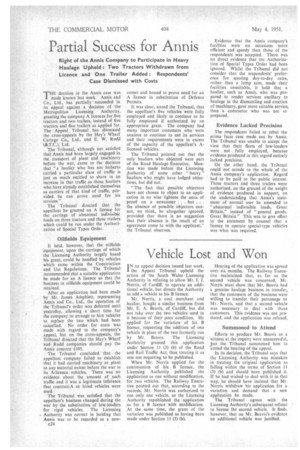Partial Success for Annis
Page 62

If you've noticed an error in this article please click here to report it so we can fix it.
Right of the Annis Company to Participate in Heavy Haulage Upheld : Two Tractors Withdrawn from Licence and One Trailer Added : Respondents' Case Dismissed with Costs
THE decision in the Annis case was made known last week. Annis and Co., Ltd., has partially' succeeded in its appeal against a decision of the Metropolitan Licensing Authority, granting the company A licences for five tractors and two trailers, instead of five tractors and five trailers as applied for. The Appeal Tribunal has .dismissed the cross-appeals by the Hay's Wharf Cartage Co., Ltd., and E. W. Rudd (B.T.C.), Ltd.
The Tribunal, although not satisfied that Millis had been largely,engaged in the transport of plant and machinery before the war, came to the decision that "a haulier who has not hitherto carried a particular class of traffic is just as much entitled to share in an increase in that traffic as those hauliers who have already established themselves as carriers of that kind of traffic, provided he can prove need for his services" The Tribunal directed that the appellant be granted an A licence for the carriage of abnormal indivisible loads on three tractors and three trailers which could be run under the Authorization of Special Types Order.
Oilfields Equipment
It held, however, that the oilfields 'equipment, upon the carriage of which the Licensing Authority largely based his grant, could be handled by vehicles which came within the Construction and Use Regulations. The Tribunal recommended that a suitable application be made for an A licence so that the business in oilfields equipment could be retained.
After an application had been made by Mr. James AMphlett, representing Annis and Co., Ltd., the operation of the Tribunal's order was deferred until yesterday, allowing a short time for the company to arrange to hire vehicles to replace the two which had been cancelled. No order for costs was made with regard to the company's appeal, but on the cross-appeals, the Tribunal directed that the Hay's Wharf and Rudd companies should pay the Annis concern f11t5.
The Tribunal concluded that the appellant company failed to establish that it had carried machinery or plant to any material extent before the war in its A-licence vehicles. There was no evidence about the amount of such traffic and it was a legitimate inference that contract-A or hired vehicles were used.
The Tribunal was satisfied that the appellant's business changed during the war by the substitution of low-loaders for rigid vehicles. The Licensing Authority was correct in holding that Annis was to be regarded as a new c24 corner and bound to prove need for an A licence in substitution of Defence Permits.
It was clear, stated the Tribunal, that the appellant's five vehicles were fully employed and likely to continue to be fully employed if authorized by an appropriate grant. The company had many important customers who were anxious to continue to use its services and their requirements were in excess of the capacity of the appellant's Alicensed vehicles.
The Tribunal pointed out that the only hauliers who objected were part of the Road Haulage Executive. Mention was made before the Licensing liuthority of some other " heavy " hauliers who might have lodged objections, but did not.
"The fact that possible objectors have not chosen to object to an application in no wise lightens the onus of proof on a newcomer . . but . . the absence of possible objectors cannot, we think, he altogether ignored, provided that there is no suggestion that their absence is the result of an agreement come to with the applicant," the Tribunal observes. Evidence that the Annis company's facilities were on occasions more efficient and speedy than those of the respondents was accepted. There was no direct evidence that the Authorization of Special Types Order had been ignored. Whilst the Tribunal did not consider that the respondents' preference for quoting day-to-day rates, rather than a lump sum, made their facilities unsuitable, it held that a haulier, such as Annis, who was prepared to render services ancillary to haulage in the dismantling and erection of machinery, gave more suitable service, than •a contractor who was not so prepared.
Evidence Lacked Precision
The respondents failed to rebut the prima facie case made out by Annis. The Tribunal was unable to accept the view that their fleets of low-loaders were not fully employed, because evidence produced in this regard entirely lacked precision.
. On the other hand, the Tribunal could not accede to the whole of the Annis company's • application. Regard had to be paid to the public interest. Three tractors and three trailers were authorized, on the ground of the weight of evidence produced in support, on the understanding that Annis's statement of normal user be amended to "abnormal indivisible loads, Great Britain." instead of "general goods, Great Britain." This was to give effect to the statement by counsel that a licence to operate special-type vehicles was what was required.




































































































